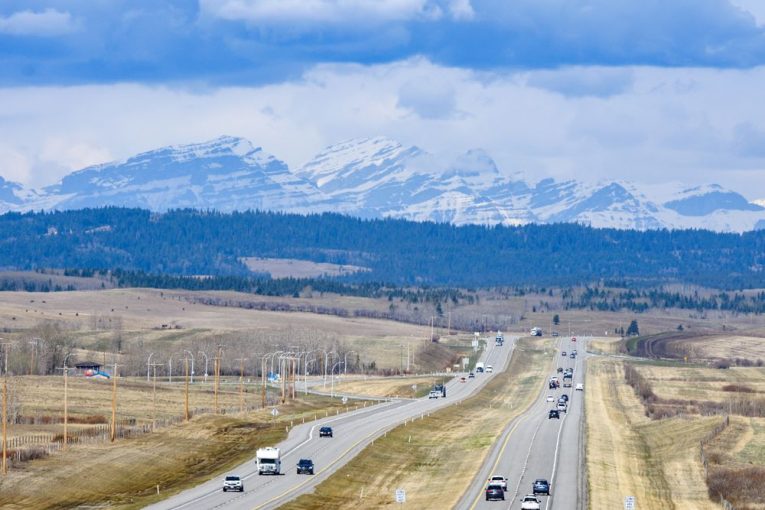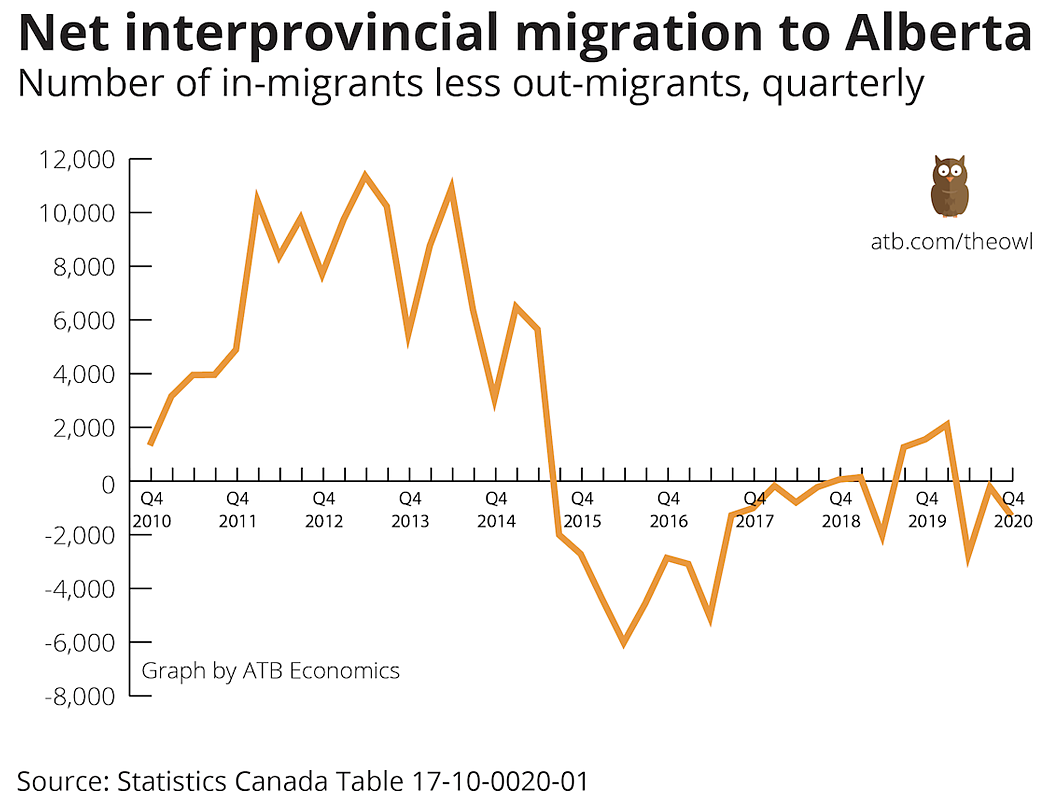
Alberta lost more than 2,000 residents to other parts of Canada in 2020 as the province coped with economic challenges of the COVID-19 pandemic coupled with ongoing struggles in the oilpatch, according to data released this week by Statistics Canada.
The final three months of 2020 marked the third consecutive quarter in which the number of people who left Alberta outpaced the total newcomers from elsewhere in the country. Nearly 60,200 residents moved out of the province to settle in other Canadian regions last year, compared to more than 58,000 Canadians who made Alberta their new home.
That net loss of 2,152 residents to interprovincial migration occurred despite Alberta’s overall population growth of 34,213 last year, which was attributed to both natural increase (births minus deaths) and international migration to the province. But the latter was still curtailed by the pandemic, down 70 per cent compared to 2019.
ATB Financial’s deputy chief economist, Rob Roach, said that although
slightly more Canadian residents moved to Alberta than left
in 2019,
the 2020 figures
were in line with an overall trend that began during the recession of 2015.
“When the economy was hot, really right up to 2014, we were a strong net gainer interprovincially, on the positive side of the ledger, quarter after quarter, year after year,” Roach said.
“That’s Alberta’s history going back decades. We’ve tended to attract more people than have moved away within the country. The opposite has really been true since 2015.”
Alberta gained 120,488 residents from other parts of Canada from 2010 to 2014. Since then, Alberta has experienced a net loss of 23,147 residents to the rest of Canada.

Canada’s population growth in 2020 was vastly reduced because of the COVID-19 pandemic,
according to Statistics Canada
.
The country’s population increased by 149,461, or 0.4 per cent, about one-quarter of the growth seen in 2019 when it grew by 575,038 people, or 1.5 per cent. It was the lowest annual growth since 1945 (in number) and 1916 (in per cent), both periods in which Canada was at war.
Deaths in Canada surpassed 300,000 for the first time last year, as the Public Health Agency of Canada reported that 5.1 per cent of the country’s fatalities were caused by COVID-19.
Alberta took an “extra blow” on top of the pandemic due to struggles in the oil and gas sectors, said Roach, adding 2021 could bring similar trends.
“With the oilpatch struggling last year, sure enough, we’ve seen the interprovincial numbers go negative,” he said.
“In terms of economic growth, you do want to be on the positive side because that’s population growth. That means people are looking for homes, looking to rent a place, they’re out shopping. It’s certainly not a mass exodus or something, but it is enough that it’s the wrong direction in terms of the arrow.”
Blake Shaffer, an economist at the University of Calgary’s School of Public Policy, said recent job losses in Alberta have likely impacted people’s decision of whether to remain in the province.
“It’s nice to think of it as a tension between two forces, one pulling you somewhere and one keeping you here,” Shaffer said.
“We’ve got all of these bonds that keep us here — our friends or family, and importantly, our job. So when people lose their jobs, they cut one of these strong bonds that keeps us here. That downturn in the economy — both pre-COVID and certainly during — means many of these bonds have been broken for many people, so they’re starting to look elsewhere.”
But Shaffer said Alberta’s overall population growth is an encouraging sign, as the province continues to lead the country in natural growth on a per capita basis.
“This is quite simply because we’re young,” he said. “We’ve got more people in the child-rearing stage than we do in the dying stage of their lives. That’s really what’s keeping Alberta’s population afloat.”
Last year, Alberta lost its most residents to B.C., with a net loss of 8,215 residents who moved west.
B.C. also led the country with the largest net gain from interprovincial migration, while Saskatchewan experienced the greatest net loss.
“Alberta and B.C. trade people back and forth a lot,” said Roach.
“In terms of that churn between the two provinces, the last year B.C.’s just been doing better and so people head west looking for opportunity.”
Twitter:
@SammyHudes
You can read more of the news on source
